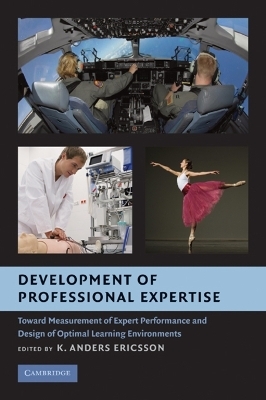
Development of Professional Expertise
Cambridge University Press (Verlag)
978-0-521-74008-1 (ISBN)
Professionals such as medical doctors, aeroplane pilots, lawyers, and technical specialists find that some of their peers have reached high levels of achievement that are difficult to measure objectively. In order to understand to what extent it is possible to learn from these expert performers for the purpose of helping others improve their performance, we first need to reproduce and measure this performance. This book is designed to provide the first comprehensive overview of research on the acquisition and training of professional performance as measured by objective methods rather than by subjective ratings by supervisors. In this collection of articles, the world's foremost experts discuss methods for assessing the experts' knowledge and review our knowledge on how we can measure professional performance and design training environments that permit beginning and experienced professionals to develop and maintain their high levels of performance, using examples from a wide range of professional domains.
K. Anders Ericsson, PhD, is presently Conradi Eminent Scholar and Professor of Psychology at Florida State University. For the last thirty years he has studied the development of expert performance in domains such as music, chess, medicine, business, and sports, and how expert performers attain their superior performance by acquiring complex cognitive mechanisms and physiological adaptations through extended deliberate practice. He has edited several books on expertise, such as Toward a General Theory of Expertise (1991), The Road to Excellence: The Acquisition of Expert Performance in the Arts and Sciences, Sports, and Games (1996), and the influential Cambridge Handbook of Expertise and Expert Performance (2006). His research has been recently featured in New York Times, Scientific American, Fortune Magazine, New Scientist, and Time magazine. He is also a Fellow of the American Psychological Association, the Association of Psychological Science, and the Center for Advanced Study in the Behavioral Sciences.
1. The Measurement and Development of Professional Performance: An Introduction to the Topic and a Background to the Design and Origin of this Book K. Anders Ericsson, Ray Perez, David Eccles, Laura Lang, Eva Baker, John Bransford, Kurt VanLehn and Paul Ward; Part I. Challenges in Past and Contemporary Efforts to Measure and Train the Objective Performance of Professionals: 2. The 20th Century Revolution in Military Training Ralph Ernest Chatham; 3. Developing Professional Expertise with a Cognitive Apprenticeship Model: Examples from Avionics and Medicine Susanne P. Lajoie; 4. Leadership Development and Assessment: Describing and Rethinking the State of the Art Michael D. Mumford, Tamara L. Friedrich, Jay J. Caughron and Alison L. Antes; 5. Revolutions, Leaders, and Diagnosticians: Reflections on the Themes in Chapters 2-4 Earl Hunt; Part II. Past and Contemporary Efforts to Design Instruction, Train, and Maintain Professional Performance: 6. Research on Past and Current Training in Professional Domains: The Emerging Need for a Paradigm Shift Jeroen J. G. van Merriënboer and Eddy W. Boot; 7. Designing Training for Professionals Based on Subject Matter Experts and Cognitive Task Analysis Jan Maarten Schraagen; 8. How to Help Professionals Maintain and Improve Their Knowledge and Skills: Triangulating Best Practices in Medicine Dave Davis; 9. Advances in Specifying What Is To Be Learned: Reflections on the Themes in Chapters 6-8 Richard E. Mayer; Part III. The Assessment and Training of Skilled and Expert Performers in the Military: 10. Toward a Second Training Revolution: Promise and Pitfalls of Digital Experiential Training Ralph Ernest Chatham; 11. Evaluating Pilot Performance Brian T. Schreiber, Winston Bennett Jr, Charles M. Colegrove, Antoinette M. Portrey, David A. Greschke and Herbert H. Bell; 12. Contrasting Submarine Specialty Training: Sonar and Fire Control S. S. Kirschenbaum, S. McInnis and K. P. Correll; 13. Training Complex Cognitive Skills: A Theme-Based Approach to the Development of Battlefield Skills Scott B. Shadrick and James W. Lussier; 14. Structuring the Conditions of Training to Achieve Elite Performance: Reflections on Elite Training Programs and Related Themes in Chapters 10-13 Robert A. Bjork; Part IV. The Development of Expertise and Expert Performance: 15. The Influence of Learning Research on the Design and Use of Assessment Eva L. Baker; 16. Acquiring Conceptual Expertise from Modeling: The Case of Elementary Physics Kurt VanLehn and Brett van de Sande; 17. Teaching for Expertise: Problem-Based Methods in Medicine and Other Professional Domains Henny P. A. Boshuizen; 18. Enhancing the Development of Professional Performance: Implications from the Study of Deliberate Practice K. Anders Ericsson; 19. It Takes Expertise to Make Expertise: Some Thoughts about Why and How and Reflections on the Themes in Chapters 15-18 John D. Bransford and Daniel L. Schwartz; Part V. General Discussion: 20. The Value of Expertise and Expert Performance: A Review of Evidence from the Military J. D. Fletcher; 21. Expertise in the Management of People: A New Frontier for Research on Expert Performance Susan E. F. Chipman.
| Zusatzinfo | 21 Tables, unspecified; 17 Halftones, unspecified; 34 Line drawings, unspecified |
|---|---|
| Verlagsort | Cambridge |
| Sprache | englisch |
| Maße | 152 x 229 mm |
| Gewicht | 830 g |
| Themenwelt | Geisteswissenschaften ► Psychologie ► Arbeits- und Organisationspsychologie |
| Geisteswissenschaften ► Psychologie ► Pädagogische Psychologie | |
| ISBN-10 | 0-521-74008-8 / 0521740088 |
| ISBN-13 | 978-0-521-74008-1 / 9780521740081 |
| Zustand | Neuware |
| Haben Sie eine Frage zum Produkt? |
aus dem Bereich


